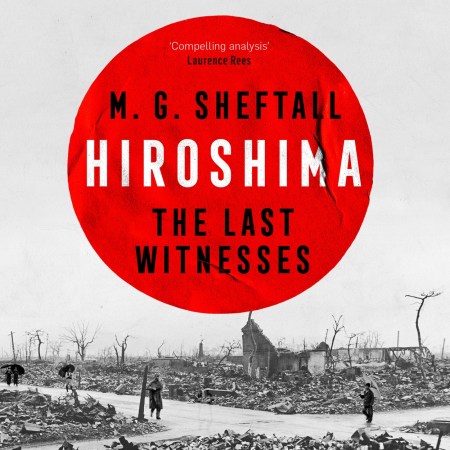‘a master class in eyewitness storytelling . . . this gripping narrative chronicles one of history’s darkest nightmare moments’ – Annie Jacobsen, author of Nuclear War: A Scenario
The stories of hibakusha – Japanese for atomic bomb survivors – lie at the heart of this compelling minute-by-minute account of 6 August 1945 – the day the world changed forever as the Enola Gay dropped its payload over Hiroshima, ushering in the nuclear age. These survivors and witnesses, now with an average age of over 90, are the last people alive who can still provide us with reliable and detailed testimony about life in Hiroshima before the bombings. In this heart-stopping account they relay what they experienced on the day the city was obliterated, and what it has been like to live with those memories and scars over the rest of their lives.
M. G. Sheftall has spent years personally interviewing survivors who were just adolescents at the time but have lived well into their nineties, allowing him to construct portraits of what Hiroshima was like before the bomb, and how catastrophically its citizens’ lives changed in the seconds, minutes, days, weeks, months and years afterwards. Fluent in spoken and written Japanese, his deep immersion in Japanese society has given him unprecedented access to the hibakusha in their waning years. Their trust in him is evident in the personal and traumatic depths they open up for him as he records their stories.
The result is a deeply human history of an unfathomable tragedy, which continues to haunt the world today.
The stories of hibakusha – Japanese for atomic bomb survivors – lie at the heart of this compelling minute-by-minute account of 6 August 1945 – the day the world changed forever as the Enola Gay dropped its payload over Hiroshima, ushering in the nuclear age. These survivors and witnesses, now with an average age of over 90, are the last people alive who can still provide us with reliable and detailed testimony about life in Hiroshima before the bombings. In this heart-stopping account they relay what they experienced on the day the city was obliterated, and what it has been like to live with those memories and scars over the rest of their lives.
M. G. Sheftall has spent years personally interviewing survivors who were just adolescents at the time but have lived well into their nineties, allowing him to construct portraits of what Hiroshima was like before the bomb, and how catastrophically its citizens’ lives changed in the seconds, minutes, days, weeks, months and years afterwards. Fluent in spoken and written Japanese, his deep immersion in Japanese society has given him unprecedented access to the hibakusha in their waning years. Their trust in him is evident in the personal and traumatic depths they open up for him as he records their stories.
The result is a deeply human history of an unfathomable tragedy, which continues to haunt the world today.
Newsletter Signup
By clicking ‘Sign Up,’ I acknowledge that I have read and agree to Hachette Book Group’s Privacy Policy and Terms of Use
Reviews
M.G. Sheftall's Hiroshima presents as a master class in eyewitness storytelling. As poignant as it is powerful, this gripping narrative chronicles one of history's darkest nightmare moments-the atomic bombing of Hiroshima in August 1945-and the memories of its surviving eyewitnesses. As the events fade from living memory, Hiroshima is at once a brilliant tribute and a cautionary tale.
A compelling analysis of the suffering endured by the citizens of Hiroshima in the aftermath of the dropping of the nuclear bomb on 6 August 1945. Written by a scholar who lives and works in Japan, and who has interviewed many of the last survivors, this is a book that offers valuable insights into Japanese thinking during the war and the subsequent struggle to rebuild the country.
M. G. Sheftall takes us on a deep dive into one of the most significant and horrific events in world history. Hiroshima is a gripping, moving story of fear and shame, courage and grace, and a powerful argument that we should never, ever use these weapons again.
For those who want to understand what happened underneath the mushroom cloud - and shouldn't we all? - Sheftall's sweeping, sensitive and deeply researched book is required reading for our human hearts.
Painful in substance but lyrical in form, Hiroshima should be required reading for political leaders, those interested in war and peace, and anyone who has grown numb to the specific horrors of World War II.
A carefully and respectfully researched oral history...[the book] tells [the hibakusha's] stories, in all their ruthless violence and gory pathos, but, most important, as a cautionary tale about the perils of nuclear warfare.
What also separates Hiroshima from other accounts is the amount of time, patience and trust Sheftall gives to each hibakusha (atomic bomb survivor) he meets.

